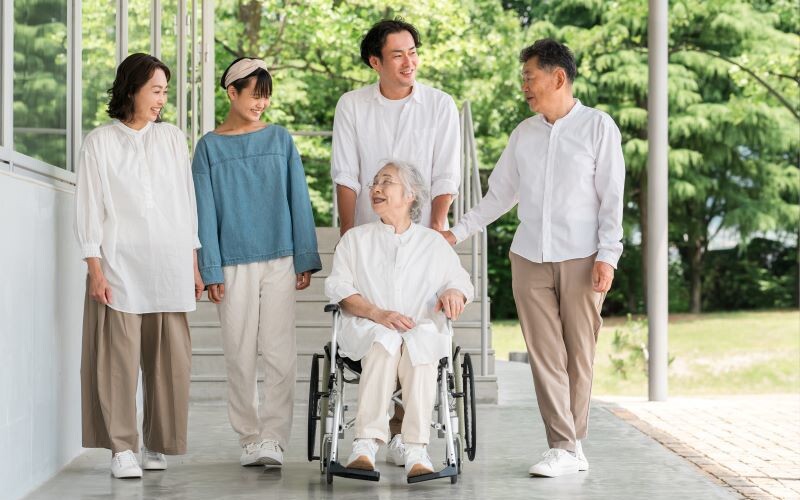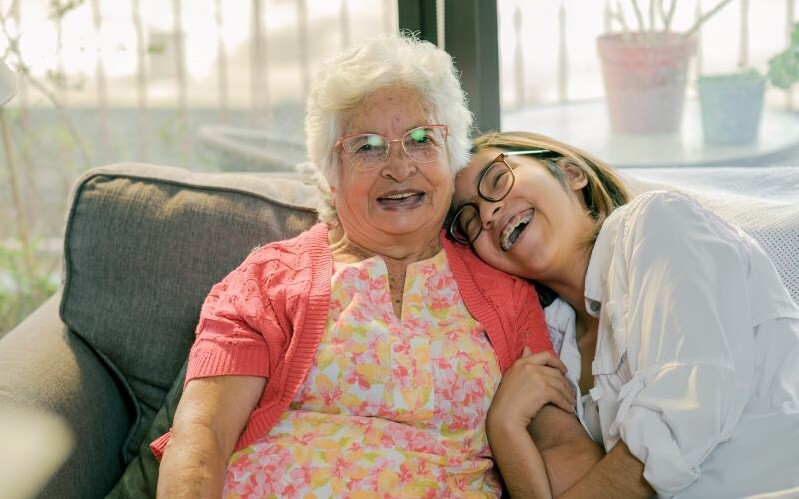It can be difficult to watch those we care about age, especially when age leads to illness or mental decline. One unfortunately common disease many elderly people face is dementia. Because dementia is a progressive disease, the condition of someone suffering from it is always changing. This continual change can make it difficult to know what to say to or how to interact with your loved one. If you’re looking for some guidance, here are some helpful tips on how to talk with someone who has dementia.
Communication Techniques to Use When Talking to Someone with Dementia
The needs of each person with dementia are different, and it will be up to you to use your best judgment and assess what is needed for your loved one’s unique situation.
Remember that dementia is an unpredictable disease, and episodes of dementia symptoms may occur without any real trigger. However, there are things you can do to avoid triggering episodes. Avoid putting your loved ones in an unfamiliar or overwhelming environment, and do what you can to alleviate any pain or confusion they may be experiencing.
As you converse, here are some more general dos and don’ts that can help.
Things to Remember
- Plan an appropriate amount of time to visit. Try not to be rushed or stressed; a relaxed environment will help the conversation flow more smoothly. It’s OK if things move at a slower pace than you’re used to.
- Maintain a caring and positive attitude. Managing your own emotions can be hard when someone you care about is going through a degenerative disease, but this is a time when your support is needed more than ever.
- Sit or stand at eye level or lower with your loved one. Try not to stand over your loved ones, as that can be intimidating. Instead, meet them at their eye level or below to create an equal, relaxed environment. Maintain eye contact.
- Create a comfortable environment for conversation. Remove any distractions, such as television, music, or phone notifications. Distractions will degrade the environment for both of you and make it especially harder for your loved one to focus on the conversation.

- Be patient and give your loved one time to respond. It may take people with dementia a bit longer to reply; try not to finish their sentences for them or interrupt what they are saying.
- Practice active listening. Maintain eye contact, repeat back to your loved one what has been said, and use body language to express your interest in what your loved one is saying.
- Speak in short, clear sentences. Introducing too many ideas at once can overwhelm or confuse your loved one. Try instead to focus on one topic at a time.
Things to Avoid
- Don’t argue or contradict what your loved one is saying, even if you know it’s inaccurate. False memories, hallucinations, delusions, and even time-shifting—acting as though they are living in an earlier part of their life—are not uncommon for people with dementia. Trying to correct them can lead to more distress and confusion. Instead, redirect the conversation.
- Don’t act infantilizing or patronizing. This means treating the person like a small child who doesn't understand, or acting superior or condescending toward them. Your loved one may understand more than you think, and making incorrect assumptions will ultimately lead to hurt feelings.
- Don’t speak for your loved one, especially when it comes to medical needs. Allow them the dignity of voicing their own feelings, questions, and concerns.
- Don’t speak in a loud voice, unless your loved one has hearing problems. Louder does not always mean clearer, and shouting doesn’t make you more understood—in fact, it can do the opposite! Of course, if the person you’re speaking to has a difficult time hearing, it’s OK to raise the volume a bit.
- Don’t ask your loved one if they remember something. Asking or insisting that a loved one remember a past event can cause confusion and distress.

- Don’t interrupt or interject. Doing so might cause your loved one to lose his or her train of thought, throwing off the conversation entirely. Don’t be afraid of the silence; your patience will be appreciated.
- Don’t forget they’re in the room. In a group setting, people with dementia may have difficulty keeping up with the multiple fast-paced conversations swirling around them. Make efforts to include your loved one in the conversation, and encourage him or her to engage with others.
Questions and Dementia
Questions are an important part of communication; however, at the same time, asking too many questions can be overwhelming to someone with dementia. You might need to ask a few questions over multiple visits instead of trying to do too a lot of questions in one sitting.
If you have to ask a question, try to keep it simple, and avoid asking questions that require memory recall. A lot will depend on the situation and your loved ones. Broad questions might be better for some situations, and specific questions will be better for other situations. The key to remember is to make the conversation as low-stress for your loved one as possible and avoid memory recall or drawing attention to the fact that they can't remember something.
When asking questions related to the present, try to avoid open-ended questions. Instead, ask questions that can be answered with “yes” or “no.” For example, instead of asking, “When do you want to eat lunch?”—for example—try saying, “Would you like to eat lunch now?”
Another strategy is giving specific options. Some types of dementia make it difficult for people to recall the words for things, so giving them specific options saves them the frustration of not being able to find the word they want to use. For example, use questions like “Would you like a salad or a sandwich for lunch?” or “Would you prefer the window to be open or closed?”
How to Ask Someone with Dementia About Family History
If you have family history questions for your loved one, avoid having an interview or an interrogation. Remember, direct questions can be distressing for someone with dementia because some people with dementia are aware that they can’t remember, and they will find it upsetting. Don’t stress about the details, and don’t go into the conversation expecting a linear account. Detailed facts about your loved one’s life can often be found from other sources—other family members, official records, journals, or even sources such as newspaper clippings. Instead, focus on your loved one’s emotions and the memories they cherish.
Try to avoid directly asking them about a memory. Share your own memories to start the conversation, and invite your loved one to share if they feel comfortable. For example, instead of asking, “Do you remember the snowstorm we had during Christmas in 2014?” you could say, “I remember the Christmas when we were snowed in and played board games all night—it was such a good time!”
If you do ask a question, make it broad instead of asking about specific events or scenarios. It’s better to ask, “Do you have a favorite memory from your childhood?” than to ask, “What was your mother’s name?”

Here are a few topics you may want to try to learn about:
- Favorite memories about other family members, such as parents, siblings, or children
- Hobbies and interests
- Favorite books, movies, or television shows
- Favorite childhood memories
- Challenges and struggles in their life
- Holiday, family, or religious traditions
- Work or career history
- Education
- Military history
- Proudest achievements
- The most important lessons they’ve learned in life
Pay attention to how your loved ones are feeling as you both reminisce. Give them as much time as they want or need to talk. However, if you can tell that they’re becoming tired or agitated, don’t push them. Change the topic or end the visit so they can rest.
It may seem daunting, but the work is worth it. Recording a loved one’s family history can be beneficial for both of you. In fact, a 2018 study showed that memory books or life story books have a whole host of benefits for patients with dementia, including improvements in mood, quality of life, communication, and autobiographic memory.
How to Help People with Dementia Record Their Memories
With a little preparation, you can ensure that your family history conversation with your loved one is productive, uplifting, and, most importantly, preserved. Here are a few tips to help you get started:

- Use modern technology to record what they say, such as a dictation device, your phone, or a video recorder. This recording will preserve the memory for both of you. Consider uploading what you record to FamilySearch Memories to ensure that it doesn’t get lost.
- Use visual aids such as pictures or videos to help spark remembrance and guide the conversation. Talk about the pictures together. Avoid questions such as, “Do you remember who this person is?” because it may cause your loved ones distress or confusion if they cannot remember. Instead, bring up your own memories of the event pictured or comment on what you see in the photo. Audio aids, such as music from your loved one’s youth, can be similarly helpful.
- Acknowledge that some memories may not be accurate. As mentioned before, having false memories—or confabulation as it’s known medically—is a known symptom of dementia. If you have questions about the accuracy of your loved one’s memory of an event, try to find a secondary account to compare it to.
Preserve Your Loved One’s Memories on FamilySearch.org
As you navigate gathering your loved one’s memories, consider preserving them on FamilySearch Memories with a free FamilySearch account. Recording and uploading memories now will not only benefit your loved one, caregivers, and family in innumerable ways, but it will save their memories and legacy for generations to come.
Related Articles
At FamilySearch, we care about connecting you with your family, and we provide fun discovery experiences and family history services for free. Why? Because we cherish families and believe that connecting generations can improve our lives now and forever. We are a nonprofit organization sponsored by The Church of Jesus Christ of Latter-day Saints. To learn more about our beliefs, click here.




